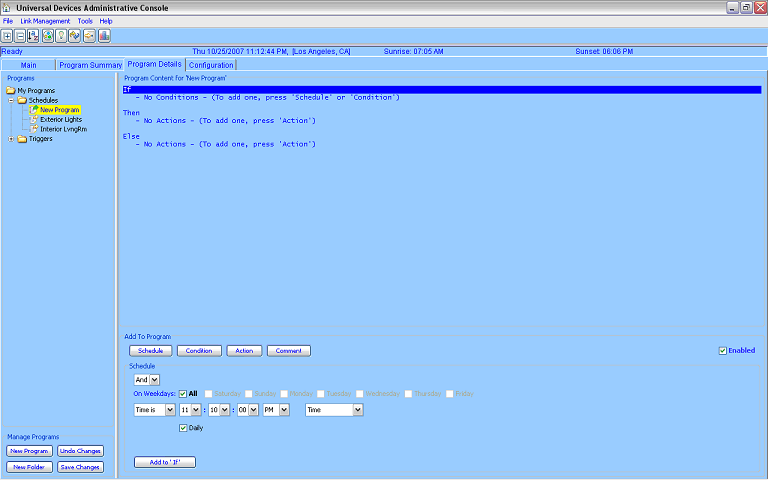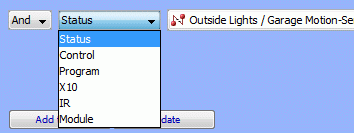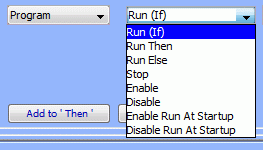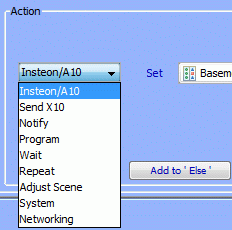ISY-99i/ISY-26 INSTEON:Add to Program
This area facilitates the user in building the program. It simplifies the program building process by providing the user a preformatted edit space filled in using Schedule, Condition and Action buttons. It even provides you with a button to add comments in the program.
- IF – has the condition that must be met to for the program to run. This condition is the trigger for the program to take action.
- THEN – is the primary action when the condition is met. The program here stays running as long as the condition is met or True.
- ELSE – is the secondary action when the condition is no longer met or False and only after the primary action was taken.
Your program is not limited to one condition and action. You can have multiple condition and actions defined in the program. Multiple conditions are created using the And/Or pull down menu field. Buttons labeled Add And (...) or Add Or (...) will be available only after a second condition is added. The use of this button allows adding a parenthesis to your program condition. An example of a program with multiple condition and action is shown below.

The enabled check box allows the system to run the program. Unchecking this box disables the program.
Schedule
The schedule button is used to enter time events into the IF section as a condition. When selected the lower portion of the Add to Programs area changes its selection fields.
A check box for each day of the week and All (for all days) is available. This set the days of the week the timer event will occur.
There are six pull down menu fields beneath the weekday checkbox. The first 5 fields define the occurrence and the sixth field defines if the occurrence is based on Time, Sunrise, Sunset or Last Run. Depending on the selection on the sixth field, the time set field (fields 2 to 5) setting will change. Refer to Figure 53 and Figure 54.
A schedule can be set to occur at a specific or between the specified times. Selecting Time Is (refer to Figure 51) is for setting a specific time and From/To (refer to Figure 52) is setting for between specified times.
The To field can be changed to For, defining the duration of the event based on time the start time. If you assigned a timer event to start at a time in a specific day of the week, and the For duration puts the end time to the next day, the ISY will complete the event timer on the next day. The timer event will always start at the set time of the selected weekday. For example, the start time (From) was set at 1:00PM on Monday and would last For 23Hrs. In this example the event will end on Tuesday at 12:00 noon. It will always start on Monday and end on Tuesday. This is a valid setting.


Longer daylight and shorter night time in summer. Shorter daylight and longer night time in winter. The change in sunrise and sunset time through out the year from winter to summer meant that a fixed predetermined turn on or off time of lights meant you may either be turning on or off the lights too early or too late. Timer event based on Sunrise or Sunset instead of a specific time should solve this. You have the option to advance or delay the event to occur by setting the time and before/after fields.

The Last Run option is an event timer based on the last runtime of the selected program. Refer to Figure 54.

To add a timer event to a program, select or create a new program. Set the time conditions for the timer event. Click on ‘Add to IF’ button to place the timer condition in the program.
Condition
Unlike the Schedule button that that uses the time as a trigger, the condition button uses the devices or a program to trigger the action. Conditions defined are added to the IF section.

To add a condition to a program, first select or create a program, and then press the Condition button.
When you have finished entering the condition information, press the [Add to 'If'] button to add it to the
'If' section of the program.
A condition is based on:
- Status
- The status of an Insteon Device (eg. its current on-level)
- Control
- An Insteon control (eg. a button pressed 'Fast On')
- Program
- The true/false status of another program.
- X10
- Receiving an X10 command.
NOTE: X10 messages are usually sent in pairs, the first identifying the devices, the second containing the command. This is automatically handled for you, thus you simply enter the house code/unit code/command code. - IR
- If the ISY has the optional Infra-Red receiver this will trigger the program upon reception of an IR signal.
- Module
- The Electricity and add-on modules can also be used to trigger programs.
The program state is set to True when the program enters the Then path and False when it enters the Else path. Folder conditions can be set based on the program state. This state is also reported in the Status column in the program summary table.
Action
The "Action" button adds the action information in the ‘Then’ and ‘Else’ section of the program. It is defines the action taken after the condition is met or the trigger occurs.
An Action can be setting a device to a defined state that is ON/OFF or set level. The type of Action is dependent on the device type. The two types of device Actions that are supported are INSTEON or Send X10 .
Sends this as a complete X10 command.
Sends an e-mail notification to the addresses entered in the system configuration.

- Run (If)
- Runs the Conditions of the specified program.
- Run Then
- Runs the Then section of the specified program disregarding any Conditions. \
- Run Else
- Runs the Else section of the specified program disregarding any Conditions.
- Stop
- Stops the specified program.
- Enable
- Enables the specified program.
- Disable
- Disables the specified program.
- Enable Run At Startup
- Sets the specified program to run when the ISY is restarted.
- Disable Run At Startup
- Sets the specified program to not run when the ISY is restarted.
Waits for the specified amount of time. If the Random checkbox is checked, then a random value from 0 to the specified time is used.
Repeats the number of times specified. If the Random checkbox is checked, then a random value from 0 to the number of times specified is used.
Continuously repeats at this interval, as follows:
Select a Scene Controller from the In Scene drop-down.

Or select an ISY scene.


Electricity Demand/Price Alert
Maximum Electricity Alert

Wake on LAN: Sends a WOL command to a specified device.
Resource: Sends a predescribed command over the network.
Comment
To add a comment to a program, first select or create a program, and then press the Comment button. When you have finished entering the comment, press the Update button to add it to the program.

Related Pages
ISY-26 INSTEON / ISY-99i Series INSTEON : User Guide : Program Details Tab
ISY-26 INSTEON /
ISY-99i Series INSTEON :
How-To Guide :
Programs
